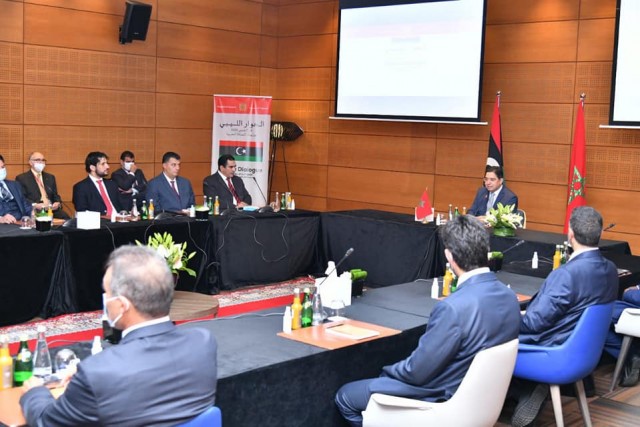Rabat – Morocco’s Minister of Foreign Affairs Nasser Bourita said the results of the discussions between Libya’s rival factions, held in Bouznika earlier, this month are “encouraging.”
In an interview with the Pretoria-based Institute for Security Studies (ISS), Morocco’s foreign minister said the talks between Libya’s top officials held in Bouznika from September 6-10 represent an “important milestone that transforms a years-long impasse into a real momentum.”
The official said such an initiative could push for a definitive solution for the Libya crisis as delegations from both the Libyan High State Council and the Parliament of Tobruk agreed on dispatching sovering leadership positions “for the first time.”
The delegations also vowed to continue dialogue to find a solution that would end the conflict, which has caused a humanitarian crisis in the country.
Following the talks, delegations from Libya’s Tobruk Parliament and High State Council said they reached a “comprehensive agreement,” thanking Morocco’s government and King Mohammed VI for hosting the productive meetings.
“Morocco stood and will stand by the Libyan people to help them regain their stability, progress and well-being,” Bourita emphasized.
He said Morocco did not make any recommendations beyond encouraging Libyan paties to the conflict to hold talks to find a political solution for the conflict.
When asked whether Libyan parties can find a lasting solution to the crisis, Bourita expressed confidence that the “Libyan brothers can find a Libyan solution.”
Morocco’s opposition to foreign interference in Libya
Morocco’s government has long condemned foreign intervention, which has worsened the situation in Libya amid the COVID-19 pandemic.
The country’s authorities have repeatedly said its initiatives solely seek to contribute to finding a political solution to the conflict, emphasizing that Morocco’s neutral position has one objective: To help Libyans enjoy their fundamental rights and defend the sovereignty of the Libyan state.
“The principled stand of His Majesty King Mohammed VI is that the solution will be Libyan or will not be! It will be political or will not be! It will be inclusive or will not be! And most and foremost, it should not and cannot be military,” Bourita said.
Such interference, “especially the arms flow that is fuelling the conflict,” constitutes a threat to “the security of the entire Sahelo-Mahrebian region.”
Bourita recalled Morocco’s security approach, saying the North African country remains cautious about the situation in Libya and the region at large.
The foreign minister said Morocco is monitoring “very closely the distribution trends in the Sahel,” which Moroccan top security officials describe often as a “breeding ground for terror organizations.”
“The Sahel region is facing structural challenges and mounting complex and interconnected threats. Addressing the root causes of these structural challenges requires collective and resolute action,” Bourita underlined.
Morocco urges collective action against a collective threat
Ensuring security calls for cooperation between countries in the region as a shared responsibility.
Bourita’s statements echo concerns from some of Morocco’s other top officials, including the Head of the Central Bureau of Judicial Investigations (BCIJ), Abdelhak El Khiame.
In several interviews, El Khiame warned that several security weaknesses have emerged in the Sahel region, underscoring the link between terrorism and drug trafficking.
He said that gangs in the region commit illegal activities as means of escaping from poverty, describing trafficking as a clear means of financing terrorism in the region.
Morocco’s El Khiame also called for collaboration to combat security threats, not only in Libya but throughout the region.
Like El Khiame, Bourita also believes that fulfilling a shared responsibility to combat crime in the region is the only solution.
“I see no alternative to closer and more resolute cooperation between Sahelo-Saharan countries, together and with relevant subregional organisations – I think of the G5 Sahel, CEN-SAD [Community of Sahel-Saharan States] and “ECOWAS [Economic Community of West African States], as well as the AU.”
The official called for improved “border and and security cooperation and to cripple the various illicit flows (drugs, arms, trafficking) that financially sustain this dangerous nexus in the Sahel.”

